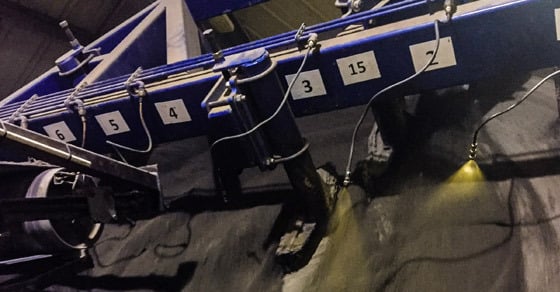Pelletizer plant process audits provide a valuable tool to plant managers struggling with changes in production, under-performance, yield, and more; even for those pelletizing plants performing well, a process audit can reveal inefficiencies that when corrected, can significantly add to the bottom line. The following takes a look at this essential, but little-known service.
When Pelletizing Plant Managers Should Consider a Process Audit
Various industries rely on pelletizing plants to convert bulk solid materials in the form of powder or fines into more manageable granules. The process is widely used throughout industries ranging from specialty chemicals and fertilizers, to additives and mineral products, and so much more.
Despite its pervasive use, however, the pelletizing process can be challenging to optimize, particularly for operations that employ a pin mixer-disc pelletizer (pan granulator) setup and are not well versed on their unique process. When these processes are not performing at their best, seemingly small inefficiencies can quickly add up, putting a dent in profit margins.
Since operational improvements have the potential to substantially impact production, there is never a “wrong time” to conduct a process audit. However, there are instances where a process audit is especially beneficial. This is typically when:
The Process is Underperforming
By far the most common reason for which pelletizing plant managers look to an audit is the need to increase on-size product yield. However, there are many potential reasons, most of which are an indication of an underperforming process:
- Increased oversize or under-size product
- Inability to reach rated capacity
- Decreased product quality such as a reduced crush strength, high attrition, non-uniform composition, or otherwise
- Frequent process upsets
- Increased cleaning and/or maintenance demands
Process Conditions Have Changed
Any change in process conditions, no matter how seemingly insignificant, has the potential to upset the careful balance of a pelletizing process. Whether a change has already been made and operators are struggling to reach continuous production, or a change is planned, a process audit is often an integral part of successfully manipulating the process to work with the new conditions. Common changes that are best carried out with a process audit include:
Feedstock Changes:
- New vendor or material origin
- Deviation in moisture content
- Change in chemical composition
- Change in particle size distribution
Process Changes:
- Added process component
- Increase or decrease in capacity/throughput
- A change in product quality requirements
Operators are Struggling
When operators are struggling to reach rated capacity, produce a quality pellet product, or yield the anticipated level of on-size product, a process audit is used to get operators – and the process – back on track. In this setting, the process audit identifies the source of the problem, be it a failure in the process itself, or a lack of operator understanding, and offers a path to resolution.
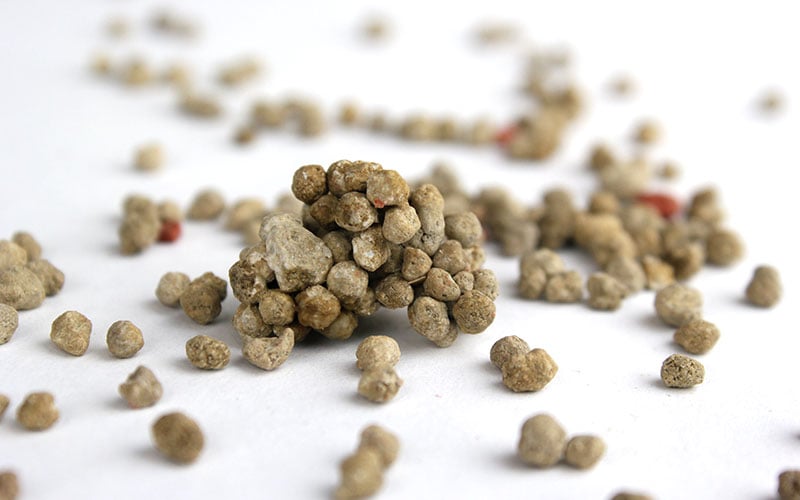
Clumped pellets such as those shown here can be a common problem with pelletizing lines not optimized properly
Benefits of a Pelletizing Plant Process Audit
As can be seen, process audits offer several opportunities to substantially improve process performance and efficiency. Potential benefits include:
- Improved product quality
- Lower energy costs
- Increased production
- Minimized downtime
- Reduced equipment wear
- Lower maintenance costs
- Reduced product loss and/or re-processing requirements
- Decreased off-spec product (increased on-size product)
- Improved operator understanding of the process and pelletizer operation
What a FEECO Pelletizing Plant Process Audit Looks Like
Note: FEECO process audits differ based on the exhibited problem, operator skill level, and several other factors. A typical process audit is outlined here.
Pelletizing Data Review & Observation
FEECO pelletizing audits begin with a thorough review of process and material data. This typically covers both current operating data and original design specifications, as a deviation from how the process or equipment was intended to perform or the expected characteristics of the feedstock is a common culprit in production problems. Process data to be reviewed often includes:
- Feedstock physical parameters
- Feedstock chemical composition
- Binder and feed rates
- Binder formulation and concentration
- Spray nozzles and locations
- Feed locations
- Scraper locations
- Moisture ratio
- Retention time
- Drying parameters
- Pin arrangement (where applicable)
- Disc speed and angle
The Process Engineer will often observe the process during production in order to assess overall performance and where potential weaknesses exist.
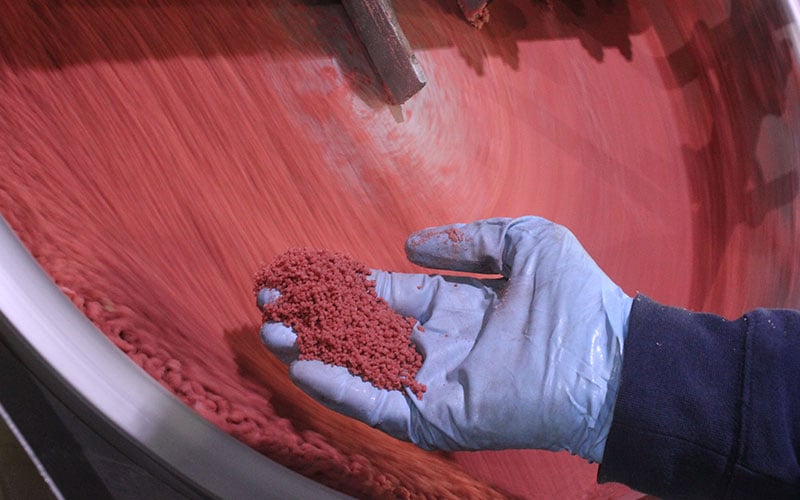
A Process Engineer inspects the pellets on a disc pelletizer
Troubleshooting
Following this initial assessment, the Process Engineer begins troubleshooting. Troubleshooting may be conducted based on what the Process Engineer suspects after reviewing the data, or, if the problem is not readily apparent, a systematic approach.
Troubleshooting may involve making mechanical adjustments to the equipment, testing changes in process parameters, or adjusting feedstock parameters in order to deduce the point of origin. This process is guided by extensive experience around pelletizing hundreds of materials.
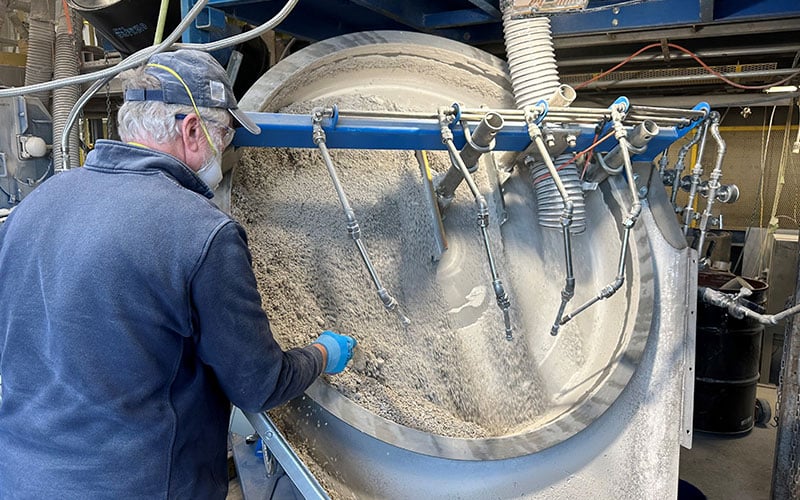
Process Engineer working on a disc pelletizer
Operator Training
As the leader in agitation agglomeration equipment and systems, FEECO takes a unique approach to process audits. Since continued pelletizing success depends largely on the operator’s understanding of the process, FEECO often incorporates pelletizer training into process audits.
Unlike a more traditional process audit where a technician works autonomously to identify and resolve the issue, FEECO Process Engineers work directly with operators to train them on the nuances behind their specific pelletizing line.
This greatly improves operator understanding, allowing operators to take more ownership in the process going forward so they are better able to optimize the process and troubleshoot issues.
Final Report
As a deliverable, FEECO provides a final report upon completion of the process audit. The report covers what was examined, where problems were identified, and how those problems were resolved. This report serves not only as a reference record, but also as valuable benchmark data. If applicable, the Process Engineer will also provide recommendations for action items to improve the process in the future.
When training is part of the process, the report also provides information on operator level of understanding prior to and after training.
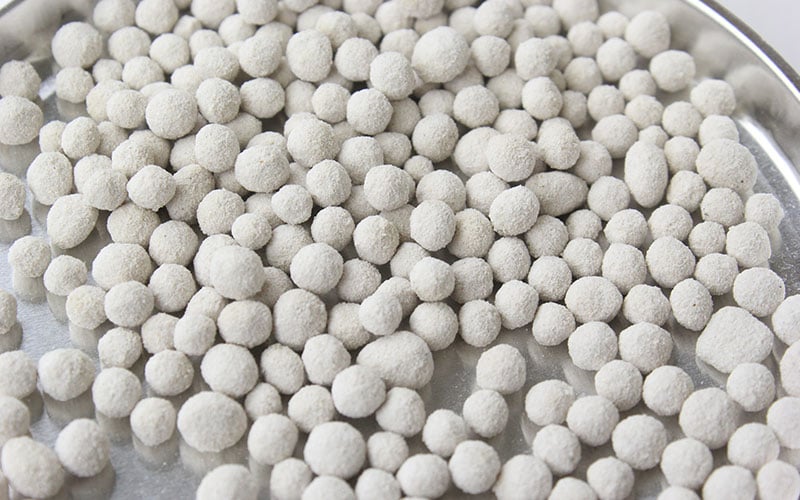
Pellets produced on a FEECO pelletizing line
Why Consider a FEECO Process Audit?
The choice to work with FEECO on a pelletizing process audit comes with several benefits:
Unmatched Expertise
FEECO has been helping customers solve their pelletizing challenges and process inefficiencies since 1951, with experience spanning nearly every industry and covering hundreds of materials and derivatives.
We Can Work With Any Brand of Equipment
FEECO’s extensive background in agglomeration also allows us to work on equipment outside of the FEECO brand; Process Engineers can assess any pelletizing process, no matter who built it.
Complete Process Knowledge
Because FEECO regularly designs and provides complete agglomeration lines, we are able to take a birds-eye view of the entire process in addition to the agglomeration component, evaluating drying, feeding, and handling.
Conclusion
Process audits are an essential tool for pelletizing plant managers to optimize their process, whether they are experiencing inefficiencies or frequent shutdowns, or they are looking to change process conditions. The potential benefits of a pelletizing process audit are significant, and cover a range of possibilities.
As the leader in agitation agglomeration process systems and equipment, FEECO pelletizing process audits provide unparalleled expertise into optimizing the pelletizing process. For more information on our process audits, contact us today!


